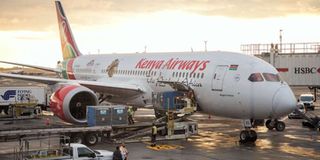KQ’s grim scorecard provides reality check

A Kenya Airways Boeing 787 Dreamliner at the JFK International Airport in New York, US. PHOTO | PSCU
What you need to know:
- The issue: Aviation industry
- Our view: It is evident that radical changes are needed to stop Uganda Airlines from tracing KQ’s ignominious path. This, though, cannot happen if we continue to deliberately refuse to accept the truth about something unpleasant.
Kenya Airways’ record Shs11 trillion full-year loss that sealed a grim milestone of a decade-long spell in the red should not be lost upon Uganda’s flag carrier—Uganda Airlines. The loss—made public last week—was attributed to increasing direct operating costs, with fuel particularly proving to be a millstone round the neck of Kenya’s flag carrier. Kenya Airways, or KQ as it is widely known, reported that fuel costs gobbled up 53 percent of its direct operating costs in the financial year ended December 2022.
Already, the International Air Transport Association (Iata) has issued a gloomy forecast for Africa’s carriers. After suffering cumulative losses of $3.5 billion for 2020 to 2022, Iata reckons the continent’s carriers will hit yet another air pocket at the cost of $213 million this year. While pre-pandemic figures of 7.7 million jobs and $63 billion in economic activity provide something of a compelling message of hope, the easing of coronavirus-related travel restrictions has not had the invigorating effect many hoped for.
In Uganda, a House committee probe report into the (mis)management of the national carrier has been put on ice. Ms Anita Among, the House speaker, says—rather ostensibly—the decision was informed by claims that the report was leaked. This farce is not only a waste of taxpayers’ money, but it denies the country an opportunity to have an honest conversation about the revival of its flag carrier.
Iata has this week launched an initiative dubbed Focus Africa. It sets out to “align private and public stakeholders to deliver measurable progress in: improving operational safety through a data-driven, collaborative programme; facilitating the growth of efficient, secure, and cost-effective aviation infrastructure; as well as promoting the liberalisation of intra-African market access through the Single African Air Transport Market (SAATM).”
Focus Africa will also dedicate itself to “accelerating the implementation of secure, effective and cost-efficient financial services; assisting Africa’s air transport industry to achieve ‘Net Zero by 2050’ emissions targets and promoting aviation-related career paths.”
We especially identify ourselves with Iata’s counsel around partnerships that involve stakeholders on the continent effectively pooling their resources. Short of this, players in the aviation industry will keep walking the floor nights.
Last August, Parliament’s Committee on State Authorities and State Enterprises (Cosase) heard that—since its revival in 2019—Uganda Airlines has incurred Shs498 billion in losses. The House committee also spotlighted several remarkable displays of ineptitude that led to the haemorrhaging of cash.
It is evident that radical changes are needed to stop Uganda Airlines from tracing KQ’s ignominious path. This, though, cannot happen if we continue to deliberately refuse to accept the truth about something unpleasant. If we make it our business to do nothing, the contagion will spread so rapidly and damagingly.


